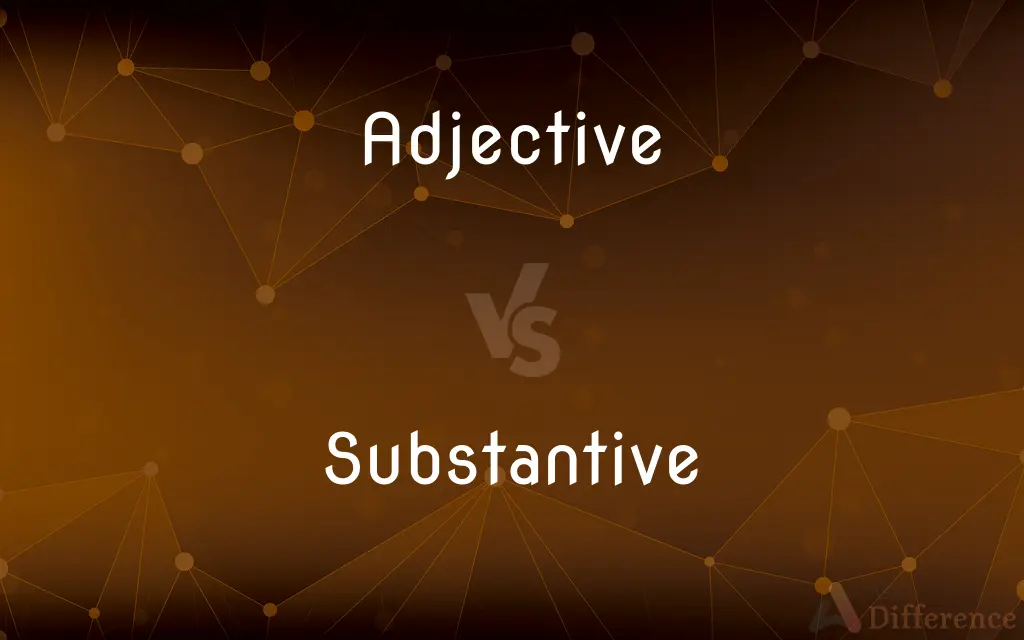Adjective vs. Substantive — What's the Difference?
By Maham Liaqat & Urooj Arif — Updated on April 23, 2024
Adjective modifies nouns by providing additional details about qualities or states, while substantive acts as a noun or noun substitute, serving as a subject or object in sentences.

Difference Between Adjective and Substantive
Table of Contents
ADVERTISEMENT
Key Differences
An adjective is a part of speech that describes, identifies, or quantifies a noun or pronoun, adding specificity and detail. For example, in "The green car," "green" is an adjective describing the car. On the other hand, a substantive is a term used in grammatical discussion to denote a noun or any word or word group functioning like a noun. For instance, "car" in "The car is fast" serves as a substantive because it acts as the subject.
Adjectives can take different forms to indicate comparative and superlative degrees, such as "small," "smaller," "smallest." These forms help compare one noun to others in terms of the adjective’s quality. Substantives do not change form based on comparison but may change to show pluralization or possession, such as "cars" or "car's."
While adjectives are used primarily to modify and provide more information about a noun, substantives themselves can perform the roles of subjects, objects, or complement within a sentence. For example, "Joy is contagious," where "Joy" functions as a substantive.
Adjectives are always dependent on a noun for their function and cannot stand alone without a noun to modify. In contrast, substantives can stand alone as they are nouns or act in the capacity of nouns within a sentence structure.
In terms of placement, adjectives usually precede the noun they modify in English, as in "beautiful scenery." However, substantives follow typical noun syntax, appearing in subject, object, or possessive positions within a sentence, such as in "The scenery is beautiful."
ADVERTISEMENT
Comparison Chart
Function
Modifies nouns/pronouns
Acts as a noun/noun substitute
Forms
Can have comparative forms
Changes for number or case
Dependency
Dependent on a noun
Can stand alone
Example Usage
"Red" in "red apple"
"Apple" in "Eat the apple."
Typical Placement
Precedes the noun
Variable positions
Compare with Definitions
Adjective
Modifies nouns by indicating qualities or states.
The bright sun warmed the room.
Substantive
Serves as the subject of a verb.
The dog barks loudly.
Adjective
Points out which one.
That idea is interesting.
Substantive
Can represent a group or collection.
Team implies collaboration.
Adjective
Shows ownership.
My book is on the table.
Substantive
Acts as a noun in a sentence.
Freedom is precious.
Adjective
Used in questions.
Which road should we take?
Substantive
Functions as the object in a sentence.
She enjoys chocolate.
Adjective
Shows quantity or extent.
She has several books.
Substantive
Acts as a subject or object complement.
The winner is she.
Adjective
In linguistics, an adjective (abbreviated adj) is a word that modifies a noun or noun phrase or describes its referent. Its semantic role is to change information given by the noun.
Substantive
Substantial; considerable.
Adjective
The part of speech that modifies a noun or other substantive by limiting, qualifying, or specifying and distinguished in English morphologically by one of several suffixes, such as -able, -ous, -er, and -est, or syntactically by position directly preceding a noun or nominal phrase.
Substantive
Independent in existence or function; not subordinate.
Adjective
Any of the words belonging to this part of speech, such as white in the phrase a white house.
Substantive
Not imaginary; actual; real.
Adjective
Adjectival
An adjective clause.
Substantive
Of or relating to the essence or substance; essential
Substantive information.
Adjective
(Law) Specifying the processes by which rights are enforced, as opposed to the establishing of such rights; remedial
Adjective law.
Substantive
Having a solid basis; firm.
Adjective
Not standing alone; derivative or dependent.
Substantive
(Grammar) Expressing or designating existence; for example, the verb to be.
Adjective
(grammar) A word that modifies a noun or noun phrase or describes a noun’s referent.
The words “big” and “heavy” are English adjectives.
Substantive
(Grammar) Designating a noun or noun equivalent.
Adjective
(obsolete) A dependent; an accessory.
Substantive
A word or group of words functioning as a noun.
Adjective
(grammar) Adjectival; pertaining to or functioning as an adjective.
Substantive
Of the essence or essential element of a thing.
Substantive information
Adjective
(legal) Applying to methods of enforcement and rules of procedure.
Substantive
(by extension) Constituting the substance of content rather than its style, and thus always nontrivial.
Substantive editing is never trivial, whereas some aspects of copyediting are trivial.
Substantive changes made by the lawyers
Adjective
Needing the use of a mordant to be made fast to that which is being dyed.
Substantive
Having substance; enduring; solid; firm; substantial.
Adjective
Incapable of independent function.
Substantive
(law) applying to essential legal principles and rules of right.
Substantive law
Adjective
(transitive) To make an adjective of; to form or convert into an adjective.
Substantive
(chemistry) of a dye that does not need the use of a mordant to be made fast to that which is being dyed
Adjective
To characterize with an adjective; to describe by using an adjective.
Substantive
Depending on itself; independent.
Adjective
Added to a substantive as an attribute; of the nature of an adjunct; as, an adjective word or sentence.
Substantive
(grammar) Of or pertaining to a substantive.
Adjective
Not standing by itself; dependent.
Substantive
Actually and legally held, as distinct from an acting, temporary or honorary rank or appointment
Adjective
Relating to procedure.
Substantive
Senseid|en|noun}} (grammar) {{clipping of noun substantive
Adjective
A word used with a noun, or substantive, to express a quality of the thing named, or something attributed to it, or to limit or define it, or to specify or describe a thing, as distinct from something else. Thus, in phrase, "a wise ruler," wise is the adjective, expressing a property of ruler.
Substantive
Part of a text that carries the meaning, such as words and their ordering.
Adjective
A dependent; an accessory.
Substantive
To make a word belonging to another part of speech into a substantive (that is, a noun) or use it as a noun
Adjective
To make an adjective of; to form or change into an adjective.
Language has as much occasion to adjective the distinct signification of the verb, and to adjective also the mood, as it has to adjective time. It has . . . adjectived all three.
Substantive
Betokening or expressing existence; as, the substantive verb, that is, the verb to be.
Adjective
A word that expresses an attribute of something
Substantive
Depending on itself; independent.
He considered how sufficient and substantive this land was to maintain itself without any aid of the foreigner.
Adjective
The word class that qualifies nouns
Substantive
Enduring; solid; firm; substantial.
Strength and magnitude are qualities which impress the imagination in a powerful and substantive manner.
Adjective
Of or relating to or functioning as an adjective;
Adjectival syntax
An adjective clause
Substantive
Pertaining to, or constituting, the essential part or principles; as, the law substantive.
Adjective
Applying to methods of enforcement and rules of procedure;
Adjective law
Substantive
A noun or name; the part of speech which designates something that exists, or some object of thought, either material or immaterial; as, the words man, horse, city, goodness, excellence, are substantives.
Substantive
To substantivize.
Substantive
A noun or a pronoun that is used in place of a noun
Substantive
Being the essence or essential element of a thing;
Substantial equivalents
Substantive information
Substantive
Applying to essential legal principles and rules of right;
Substantive law
Substantive
Having substance and prompting thought;
A meaty discussion
Common Curiosities
What is an adjective?
An adjective is a word that modifies a noun to add detail or clarification.
How do adjectives affect sentence meaning?
Adjectives provide specific characteristics to nouns, influencing how we perceive those nouns' attributes.
Can substantives be implied and not directly stated?
Yes, substantives can be implied, especially in commands or exclamations, e.g., "Stop!" where "you" is implied.
What grammatical forms can substantives take?
Substantives can appear in singular, plural, or possessive forms.
Can adjectives become substantives?
Yes, adjectives can act as substantives when they represent a noun in context, like "the rich."
Are all nouns substantives?
Yes, all nouns are considered substantives because they can function independently in sentences.
What is the role of substantives in grammar?
Substantives fill core roles like subjects and objects within sentences, crucial for sentence structure.
What is a substantive?
A substantive is any word or group of words functioning as a noun.
How do adjectives differ in usage compared to substantives?
Adjectives cannot stand alone and must modify a noun, unlike substantives, which are nouns themselves.
Why are adjectives important in English?
Adjectives enhance descriptions and detail in language, enriching narrative and expression.
Share Your Discovery

Previous Comparison
Huddle vs. Hurdle
Next Comparison
Spatula vs. TurnerAuthor Spotlight
Written by
Maham LiaqatCo-written by
Urooj ArifUrooj is a skilled content writer at Ask Difference, known for her exceptional ability to simplify complex topics into engaging and informative content. With a passion for research and a flair for clear, concise writing, she consistently delivers articles that resonate with our diverse audience.
















































